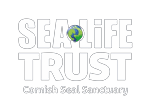Seal disturbance
Seals are semi aquatic animals, spending time both on land and in the sea! They spend roughly 20% of their time on land – digesting their food, sleeping and giving birth to pups. However, this is where they will feel the most vulnerable.
Spending time near or in the sea and sharing the environment with wildlife comes with a responsibility to be respectful and show good practise.
Disturbance isn’t always easy to detect, but in most cases, disturbance occurs when humans are too visible, too close and too loud.
Signs of Disturbance:
- Vigilance - if a seal has seen or heard you, they will instantly be on alert. This will be the first stage of disturbance, and when you should start moving away.
- Splashing and vocalisation – this is where a seal is feeling threatened, and they are telling you that you are too close!
- Stampeding into the sea – to seals, the sea is their safety. If a seal is moving quickly towards the sea, a high-level disturbance event has occurred.
What YOU Can Do to Help!
- Admire from a distance
- Keep clear of large groups and mothers with young
- Keep your dogs under control
- Be calm and quiet
- Be considerate, back off and move on to keep your encounter brief
- Leave wildlife and the environment as you found it
- Always follow the DEFRA code of conduct; Defra MCW Code - Cornwall Seal Group Research Trust
If you witness a suspected wildlife crime in action, call 101 immediately. Photographs and recordings of the incident can also be sent to the Cornwall Wildlife Trusts Marine & Coastal Code Group, via their website. If you find an injured seal in need of rescue, please contact us on 01326 221 361.

